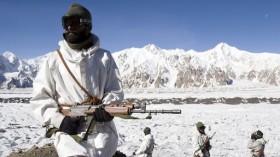
New Delhi, Dec 4 / NationalTurk – The British journalist Myra MacDonald has said India has to share major blame for the conflict between nuclear arch rivals India and Pakistan over Siachen glacier, world’s highest battleground shared.
Myra MacDonald, who is a London-based journalist with Reuters and a long-time observer of South Asia, is best known for her book on the Siachen conflict, Heights of Madness: One Woman’s Journey in Pursuit of a Secret War. Published in 2007, the research for the book took her to both sides of the conflict, on helicopter and on ground.
In an email interview with Indian’s newsportal, rediff.com, MacDonald said in both Indian and Pakistani narratives, it is the other side that is responsible for the April 1984 skirmish that began the Siachen conflict.
“While the Pakistanis say India was the aggressor, Indians says it had to occupy Siachen because Pakistan was conducting mountaineering expeditions there,” she said.
She said both sides bear some responsibility for the events that led to the outbreak of war in Siachen in April 1984, but on balance India has a greater share of the blame for setting those events in motion.
“The origins of the conflict go back to before 1978, when Pakistan authorised foreign mountaineering expeditions to the Siachen glacier. This was not unreasonable — access to the glacier historically was far easier from the Baltistan side, across the Bilafond-la, the main pass through the Saltoro. At some point, foreign maps began wrongly to mark Siachen as Pakistani territory, and this was used as an excuse by India to send a military mountaineering expedition to explore the glacier,” MacDonald said.
She said as India continued to send military mountaineering expeditions each summer to the glacier, Pakistan in turn became alarmed, sending its own men to investigate, and in the atmosphere of distrust in South Asia, mountaineering expeditions morphed into military patrols.
“Reading the protest notes sent at the time, it is clear that Pakistan genuinely believed India was intruding on its territory — it is also clear that with dialogue, the problem could have been resolved. Instead, India decided to send troops in the summer of 1984 to occupy the passes; Pakistan, worried about Indian intentions, prepared its own plan to move in; and India — by bringing forward its operation to April managed to get there first,” she said.
The British journalist said Pakistan believes the LoC should continue to join up with the Karakoram Pass, giving it control of most of Siachen; India says it should follow the natural watershed — the Saltoro ridge, giving it control of the glacier.
“While it is possible to argue both claims, it is certainly fair to say that by occupying the passes, India did try to change the direction of the LoC by force — thus making it the guilty party in breaching the Simla accords,” she said.
She said the fact that India moved into Siachen first is also frequently cited by Pakistanis as justification for its subsequent military operation across the Line of Control in Kargil in 1999 — for which they were internationally, and they say, unfairly, criticised.
Indian army would seek guarantees from Pak over Siachen conflict
The British journalist said Pakistan has no troops on the glacier itself, and India controls most of the higher positions. “There is no strategic advantage in controlling these passes and never has been — the idea sometimes floated that the Pakistan army could use these to link up with China and threaten India makes no sense when you see how difficult the terrain is”.
“It is understandable that the Indian Army, having fought so hard for control of the higher positions in the region, would not want to give these up without some kind of guarantee from Pakistan that it would not occupy posts which India had vacated,” added MacDonald.
Write your comments and thoughts below
Faiz Ahmad / NationalTurk India News
[adrotate group=”13″]

Being a Brit and in the light of it’s long and self centered imperial history, I wonder if the author has the necessary credentials to judge who has the higher moral ground.
the author should understand that no one will delegate with their enemies when their enemies are in there territory. Hope She it got well and understood my words before blaming someone.
this might be the case but wat about POK which is supposed to be the territory of INDIA moreover if pakistan was alarmed over indian troop movement then it should have reported at the UN ….pakistan cannot give an excuse for kargil 1999…and about MAJOR SOUEABH KALIA
Instead of blaming INDIA for siachen glacier everyone including the author must understand that KASHMIR is an integral part of INDIA and pakis should vacate kashmir which has been occupied by them.